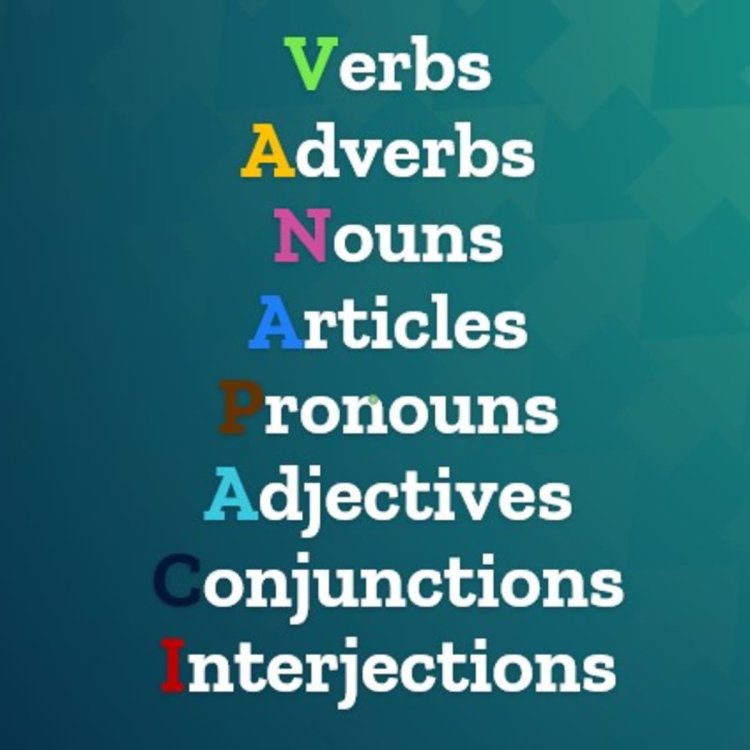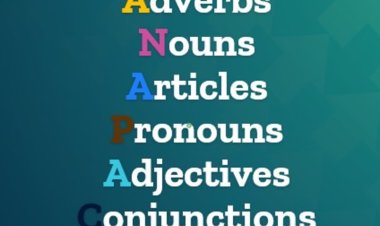Parts of Speech in English Grammar
Commonly listed English parts of speech are noun, verb, adjective, adverb, pronoun, preposition, conjunction, interjection, numeral, article, and determiner.

There are only eight types of English words, each corresponding to a specific function. A word's "part of speech" describes its function in a sentence. These parts were meant to complement one another, just like in a real workplace or an actual TV show with a cast.
Keep reading to gain an understanding of the various elements of speech and how they interact to convey meaning in the words we use every day.
The 8 parts of speech
1 Nouns
A noun is a term that designates an individual, location, idea, or thing. Whether you're talking about a basketball court, San Francisco, Cleopatra, or self-preservation, the word "thing" describes what you're talking about, so it's a noun.
Common nouns and proper nouns are the two types of nouns. Nouns like "planet" and "game show" are examples of common nouns. Names of specific entities, such as Jupiter and Jeopardy!, are called proper nouns.
2 Pronouns
Pronouns are words used in place of specific nouns when it is assumed that the reader or listener is familiar with the noun being referred to.
You may say something like, "Jennifer was supposed to be here at eight," and then add, "She's always late; next time I'll tell her to be here a half hour earlier."
If you wanted to avoid using Jennifer's name three times in a row, you could simply say she or her instead, and the statement would still make sense. There are several types of pronouns, and we explain them all in this guide:
3 Adjectives
Nouns can only be described by using adjectives. Imagine one of your favorite films. How would you explain it to a pal who has never heard of it before?
The film could be described as either humorous, interesting, well-written, or suspenseful. Adjectives are used to describe the film in this way. In some cases (as in "I have a black dog"), the adjective that modifies the noun comes before it in the sentence. Adjectives can be at the end of a phrase ("My dog is black"), although that's not always the case.
4 Verbs
Go! Do something incredible. Do your best to outrun them. Take first place! Everyone who participated and worked hard deserves your congratulations.
The highlighted phrases serve as verbs. Words like "run," "win," and "amazing" are all examples of verbs, which define a state of being.
However, not every verb describes a concrete activity. To love and to be are examples of nonaction verbs since they describe abstract concepts rather than concrete actions. On the other hand, "action verbs" describe those that do describe concrete acts.
5 Adverbs
Adjectives, verbs, and other adverbs can all be described by adverbs.
I gently entered the room.
The word "quietly" describes the manner in which you entered the room.
Every time, the cheetah will outrun the lion.
The cheetah is faster (adjective) than the lion almost always.
6 Prepositions
Prepositions tell you the relationships between other words in a sentence.
You might say, “I left my bike leaning against the garage.” In this sentence, against is the preposition because it tells us where you left your bike.
Here’s another example: “She put the pizza in the oven.” Without the preposition in, we don’t know where the pizza is.
7 Conjunctions
With the help of conjunctions, we can construct multi-thought phrases.
My favorite kind of pasta sauce is marinara. Specifically, alfredo sauce is a favorite of mine. Puttanesca is not a sauce I care for. These three statements all convey the same information clearly. Creating a list of your preferences is OK, but it's not the most effective method.
Instead, you may say something like, "I enjoy marinara and alfredo sauces but dislike puttanesca."
The conjunctions and, but, in this phrase, connect your concepts.
8 Articles
A pear. House made of bricks. It was quite the adventure. Articles are the words in bold.
There are two types of articles: those that specify and those that don't. As with the two classes of nouns, the choice of article depends on the level of detail required in the discussion at hand.
The definite article, which includes words like "the" and "this," specifies a single noun.
Where did you get the car?
The foregoing line gives us enough context to know that the speaker is referring to a specific car.
Put an indefinite article in its place now:
Did you go automobile shopping?
Do you see how your query has become more general and how the connotation that you are referring back to something specific has disappeared?
Figuring out parts of speech
It might be difficult to determine a word's grammatical category at times. Here are some simple tricks for identifying the grammatical form of a given word:
Adding -ly to an adjective makes it an adverb. Usage examples: frequently, rapidly.
A pronoun is a word that can stand in for a noun without changing the meaning of the sentence. Basketball was one of his interests, therefore we say, "He played basketball." As the saying goes, "Steve played basketball."
A verb is a term that expresses action and can be used in a phrase in which the word "do" is substituted. Here's a quote: "I have an umbrella." It's true; "I do have an umbrella."
Adjectives are often those words from which a sentence can be constructed without, with the loss of some detail. One possible instance is "She drives a red van." It's been said of her, "She drives a van."
And if you're ever in a bind, you can always look up the definition online. If a word can be used in more than one context, each possible usage is specified in the dictionary entry, along with relevant examples.
The next issue that can trip up authors and language students is related to this one.
When a word can be different parts of speech
Words that can function either as vowels or consonants, like y, are called "dual-function" words. Some instances are listed below.
Work
As a noun, "I went to work" expresses the action of actually doing so.
The verb form of the phrase "I work in the garden"
Well
"She paints very well" (superlative).
After weeks of being sick, they are now healthy.
A penny (noun) was dumped into the well by the author.
But
It was a conjunction: "I made breakfast and lunch, but Steve made dinner."
I did not remember to bring the pens you requested, but I did bring everything else.
Additionally, new elements of speech can arise as words change and develop. The word "adult" is a contemporary instance. Adult was largely a noun referring to an adult before You can also use it as an adjective to describe certain forms of entertainment, such as adult contemporary music. But then, around the start of the twenty-second century, a new verb entered the English language: adulting. When used as a verb, "adulting" describes the process of carrying out responsibilities often associated with being an adult.
Open and closed word classes
There are two types of words that describe the components of speech: open and closed.
Words are most frequently added to the open word classes. Nouns, adjectives, adverbs, and verbs are particularly prone to change as language develops. The noun "dumbphone," the verb "greenwash," and the adjective "cringe" all entered the Merriam-Webster dictionary in 2023.
Words that don't open up to additional additions easily belong to the closed word classes. Pronouns, conjunctions, articles, and prepositions are examples of more permanent components of speech.
Are you using the parts of speech correctly?
You won't have to second-guess your word choice or worry about whether or not you're breaching any grammar standards. You may just put in your text and immediately see if it contains any spelling, punctuation, or structural issues.

 Metaphorq
Metaphorq 










